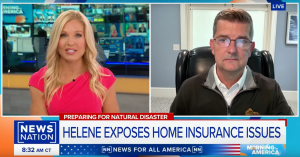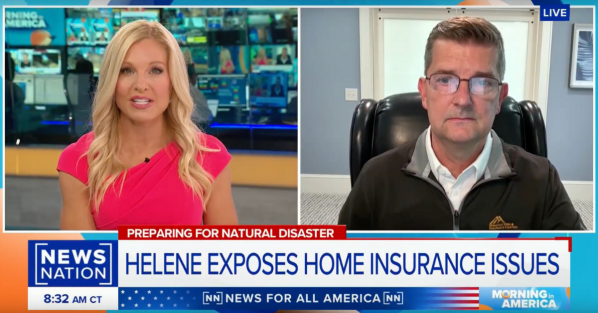Speaking with Dr. David Marlett, a professor in the Department of Finance, Banking and Insurance and Managing Director of the Brantley Risk & Insurance Center at Appalachian State University, highlights a new problem for American society: climate change is leaving communities unexpectedly underinsured more frequently.
After experiencing Hurricane Helene as it ripped through Western North Carolina on September 27 and then seeing the destruction around him in the days following it, Marlett was one of many who worked to assist devastated communities and individuals in the wake of the storm.
Marlett and fellow insurance colleagues Jamie Parson and Austin Eggers volunteered at App State’s Disaster Relief Hub for two weeks while the university paused classes and held operations only critical to the emergency and recovery. The trio helped students, staff and faculty better understand their insurance coverages.
“We went through the steps in the claims process and how to best prepare and document,” said Marlett. “We also helped people prepare their FEMA applications.”
They prepared a document utilized by other volunteers and App State employees who helped staff the relief hub. They all shared a common goal: supporting the community in its recovery.
Even before he began working with storm victims, Marlett knew it was unlikely that all his neighbors would have the insurance coverage they needed.
"It's been a really hard week meeting with people who are now realizing they should have purchased flood insurance," said Marlett. "They are upset that they made a mistake, but it is a complicated situation and few people ever expected a flood like this in our lifetimes. We've been trying to help them work through the insurance questions and hopefully find some relief from FEMA."
Marlett is a known insurance expert and a media resource. During the weeks that followed Helene, Marlett was interviewed by Wired, ABCnews, and the Associated Press as they covered the response to the devastation and resulting recovery efforts.
“It's unfortunate the way that our system is set up to where we separate perils under different policies,” said Marlett, during an October 6 interview with Markie Martin on NewsNation’s Morning in America. “They just don't have the right coverage, and so they're going to have losses that are uninsured.”
Even if he didn’t expect Helene to hit so hard and so close to home, Marlett has previously raised concerns about the current state of the commercial insurance industry and disruptive issues like workforce evolution, pandemics, and climate change.
In a 2022 post on Writing the Future, a commercial insurance blog post entitled Climate Change and the Outlook for Commercial Insurance, Marlett suggested the industry do the following.
- Support property owners who are fortifying existing structures to withstand wind and flood damage.
- Continue to work with state legislators to encourage stronger building codes and limit development in hazard-prone regions.
- Work with regulators and legislators to develop a plan for coastal residents in the event they need to eventually abandon properties in high risk coastal regions.
Looking ahead, Marlett serves as a voice of reason regarding matching insurance needs to changing climate conditions.
In an abcnews.com article, Home insurers argue for a 42% average rate hike in North Carolina, Marlett explained that while each state has different models to regulate rates, those affected by more hurricanes and storms are essentially faced with two options: Allow rates to keep rising to cover claims, or “somehow we build structures that are able to withstand climate change.
“The property insurance market for homes was already a patchwork system that really doesn’t make a lot of sense,” Marlett explained in an Oct. 2 wired.com story, Hurricane Helene Shows How Broken the US Insurance System Is. “Now you’re adding in the last couple of years of economic uncertainty, inflation, climate change, population migration—it’s just an unbelievably bad combination happening all at once.”
As for the Helene response, Marlett said he was inspired by the community in and around the High Country as well as those who came from neighboring states to help out.
“I have been inspired by a lot of my friends and colleagues and people in our community. The number of trucks heading up the mountain. Just people in a pickup truck with generators and chainsaws and shovels coming up and helping has been inspiring,” said Marlett. “It's times like this you really do appreciate your neighbors: brother helping brother, sister helping sister, people helping complete strangers!”
About the Brantley Risk & Insurance Center
The Brantley Risk & Insurance Center enhances the academic experience of business students at Appalachian State University by providing space and staff to assist with networking, job placement preparation and contact with faculty members outside the classroom. It provides students opportunities to participate in professional designation and licensing programs and invites industry leaders to participate in classes and speak to student organizations. It also fosters research and faculty development, assists the insurance industry in the design and delivery of continuing education programs, and helps educate the public about the insurance industry. Learn more at https://insurance.appstate.edu.

